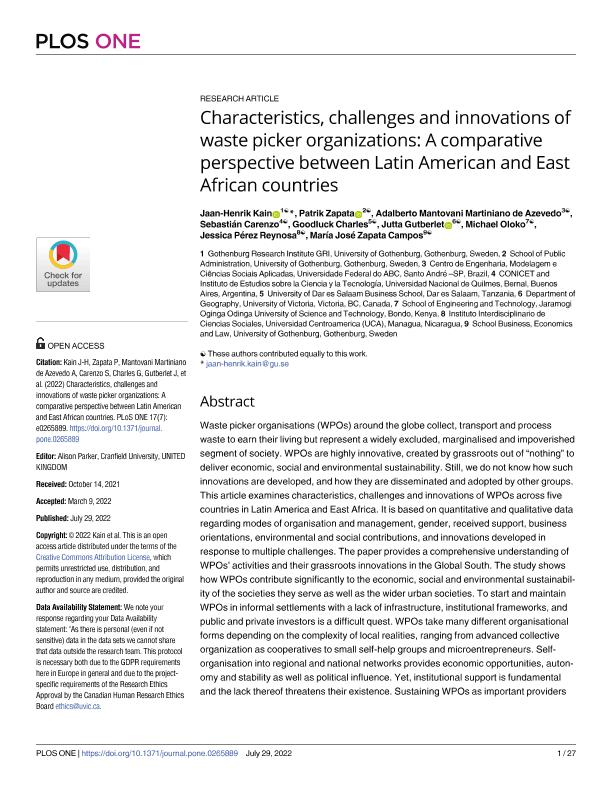Mostrar el registro sencillo del ítem
dc.contributor.author
Kain, Jaan Henrik
dc.contributor.author
Zapata, Patrik
dc.contributor.author
de Azevedo, Adalberto Mantovani Martiniano
dc.contributor.author
Carenzo, Sebastian

dc.contributor.author
Goodluck, Charles
dc.contributor.author
Gutberlet, Jutta
dc.contributor.author
Oloko, Michael
dc.contributor.author
Pérez Reynosa, Jessica
dc.contributor.author
Zapata Campos, María José
dc.date.available
2023-06-22T13:07:09Z
dc.date.issued
2022-07
dc.identifier.citation
Kain, Jaan Henrik; Zapata, Patrik; de Azevedo, Adalberto Mantovani Martiniano; Carenzo, Sebastian; Goodluck, Charles; et al.; Characteristics, challenges and innovations of waste picker organizations: A comparative perspective between Latin American and East African countries; Public Library of Science; Plos One; 17; 7-2022; 1-27
dc.identifier.issn
1932-6203
dc.identifier.uri
http://hdl.handle.net/11336/201132
dc.description.abstract
Waste picker organisations (WPOs) around the globe collect, transport and process waste to earn their living but represent a widely excluded, marginalised and impoverished segment of society. WPOs are highly innovative, created by grassroots out of "nothing"to deliver economic, social and environmental sustainability. Still, we do not know how such innovations are developed, and how they are disseminated and adopted by other groups. This article examines characteristics, challenges and innovations of WPOs across five countries in Latin America and East Africa. It is based on quantitative and qualitative data regarding modes of organisation and management, gender, received support, business orientations, environmental and social contributions, and innovations developed in response to multiple challenges. The paper provides a comprehensive understanding of WPOs' activities and their grassroots innovations in the Global South. The study shows how WPOs contribute significantly to the economic, social and environmental sustainability of the societies they serve as well as the wider urban societies. To start and maintain WPOs in informal settlements with a lack of infrastructure, institutional frameworks, and public and private investors is a difficult quest. WPOs take many different organisational forms depending on the complexity of local realities, ranging from advanced collective organization as cooperatives to small self-help groups and microentrepreneurs. Selforganisation into regional and national networks provides economic opportunities, autonomy and stability as well as political influence. Yet, institutional support is fundamental and the lack thereof threatens their existence. Sustaining WPOs as important providers of socio-environmental benefits through governmental and non-governmental actions is a worthwhile undertaking that builds sustainability.
dc.format
application/pdf
dc.language.iso
eng
dc.publisher
Public Library of Science

dc.rights
info:eu-repo/semantics/openAccess
dc.rights.uri
https://creativecommons.org/licenses/by-nc-sa/2.5/ar/
dc.subject
WASTE PICKERS
dc.subject
INNOVATIONS
dc.subject
LATIN AMERICA
dc.subject
EAST AFRICA
dc.subject.classification
Ciencias Sociales Interdisciplinarias

dc.subject.classification
Otras Ciencias Sociales

dc.subject.classification
CIENCIAS SOCIALES

dc.title
Characteristics, challenges and innovations of waste picker organizations: A comparative perspective between Latin American and East African countries
dc.type
info:eu-repo/semantics/article
dc.type
info:ar-repo/semantics/artículo
dc.type
info:eu-repo/semantics/publishedVersion
dc.date.updated
2023-06-21T10:51:52Z
dc.journal.volume
17
dc.journal.pagination
1-27
dc.journal.pais
Estados Unidos

dc.journal.ciudad
San Francisco
dc.description.fil
Fil: Kain, Jaan Henrik. University Goteborg; Suecia
dc.description.fil
Fil: Zapata, Patrik. University Goteborg; Suecia
dc.description.fil
Fil: de Azevedo, Adalberto Mantovani Martiniano. Universidad Federal Do Abc; Brasil
dc.description.fil
Fil: Carenzo, Sebastian. Universidad Nacional de Quilmes. Departamento de Ciencias Sociales. Instituto de Estudios Sociales de la Ciencia y la Tecnología; Argentina. Consejo Nacional de Investigaciones Científicas y Técnicas; Argentina
dc.description.fil
Fil: Goodluck, Charles. University Of Dar Es Salam; Tanzania
dc.description.fil
Fil: Gutberlet, Jutta. University of Victoria; Canadá
dc.description.fil
Fil: Oloko, Michael. Jaramogi Oginga Odinga University of Science and Technology; Kenia
dc.description.fil
Fil: Pérez Reynosa, Jessica. Universidad Centroamericana; Nicaragua
dc.description.fil
Fil: Zapata Campos, María José. University Goteborg; Suecia
dc.journal.title
Plos One

dc.relation.alternativeid
info:eu-repo/semantics/altIdentifier/url/https://journals.plos.org/plosone/article?id=10.1371/journal.pone.0265889
dc.relation.alternativeid
info:eu-repo/semantics/altIdentifier/doi/https://doi.org/10.1371/journal.pone.0265889
Archivos asociados
